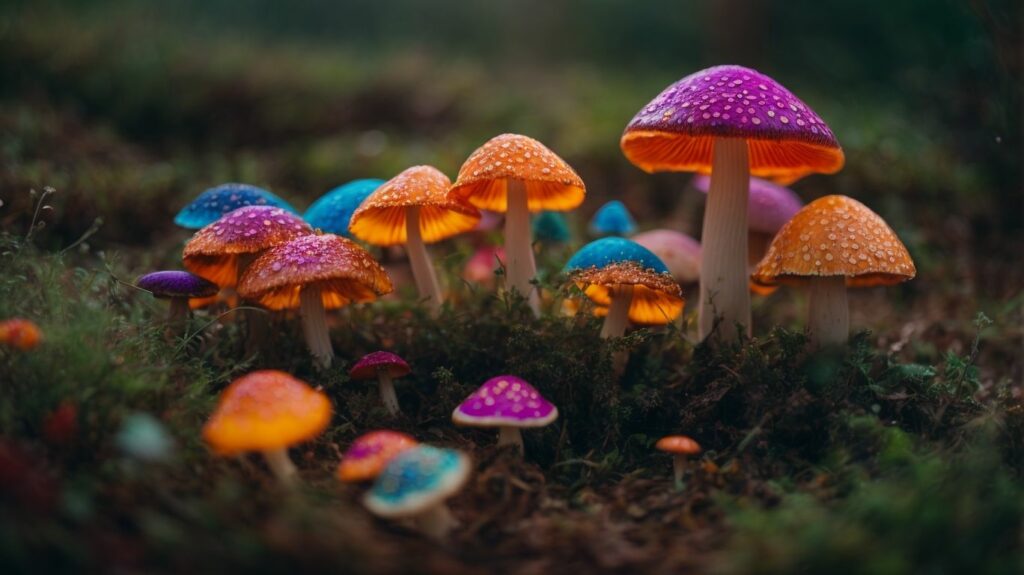Are you curious about the effects of shrooms? Do you wonder if they will show up on a drug test? We’ve all heard the stories of people failing drug tests due to shrooms, so it’s important to understand the facts. In this article, we will delve into the perplexing nature of shrooms and their presence in drug tests. So let’s dive in and uncover the truth together.
What Are Shrooms?
Shrooms, also known as magic mushrooms, are a type of fungi that contain the psychoactive compound psilocybin. Psilocybin is responsible for the hallucinogenic effects of these mushrooms. They can be found in various species and are typically ingested orally. Shrooms have been used for centuries for their mind-altering properties and spiritual purposes. However, it is important to note that their consumption can have unpredictable effects on individuals and should be approached with caution. If you are considering trying shrooms, it is recommended to educate yourself about their potential risks and effects, and to ensure a safe and supportive environment.
How Do Shrooms Work?
Magic mushrooms, also known as shrooms, contain a psychoactive compound called psilocybin that affects the brain’s serotonin receptors. Here is a step-by-step breakdown of how shrooms work:
- Ingestion: Shrooms are typically consumed orally, either by eating them directly or brewing them into a tea.
- Metabolism: Once ingested, psilocybin is metabolized into psilocin, which is the active compound responsible for the psychedelic effects.
- Binding to receptors: Psilocin binds to serotonin receptors in the brain, particularly the 5-HT2A receptors, leading to alterations in perception, mood, and cognition.
- Neurotransmitter release: Psilocin stimulates the release of neurotransmitters like serotonin, dopamine, and glutamate, resulting in changes in brain activity.
- Connectivity changes: Shrooms affect the connectivity between different brain regions, leading to a breakdown of the default mode network and increased communication between usually separate regions.
What Are the Different Types of Shrooms?
Shrooms, or magic mushrooms, are a type of psychedelic drug that have gained popularity in recent years for their mind-altering effects. However, not all shrooms are created equal. In this section, we will take a closer look at the different types of shrooms that exist. From the well-known psilocybin mushrooms to the lesser-known amanita muscaria and liberty caps, each type offers a unique experience and potential risks. So, let’s dive into the world of shrooms and explore the differences between these three types.
1. Psilocybin Mushrooms
Psilocybin mushrooms, also known as “magic mushrooms,” are a type of fungi that contain the psychedelic compound psilocybin. They have been used for centuries for their mind-altering effects. If you are interested in trying psilocybin mushrooms, here are some steps to consider:
- Research: Educate yourself on the effects, risks, and legal status of psilocybin mushrooms.
- Source: Find a trustworthy and reputable source for obtaining psilocybin mushrooms, whether it’s through a reliable supplier or by foraging them yourself.
- Preparation: Mentally and emotionally prepare yourself for the experience. Create a comfortable and safe environment in which to consume the mushrooms.
- Dosage: Begin with a low dose to assess your sensitivity and reaction. Increase gradually if desired, but be cautious not to take too much.
- Set and Setting: Be mindful of your mindset and the surroundings in which you consume the mushrooms. Choose a calm and peaceful setting with individuals you trust.
- Integration: After the experience, take time to reflect on any insights and emotions that arose. Journaling or discussing with a trusted friend or therapist can be beneficial.
2. Amanita Muscaria
Amanita Muscaria, also known as the fly agaric, is a type of mushroom that is known for its distinct appearance with a bright red cap and white spots. This mushroom has a long history of use in various cultures for its psychoactive compounds. However, it is important to keep in mind that Amanita Muscaria can be toxic if consumed in large quantities and its effects can vary greatly from person to person. It is recommended to use caution and seek expert guidance when considering the use of Amanita Muscaria or any other psychoactive substances.
Just like a cap, these shrooms may give you a little ‘liberty’ from reality, but don’t expect any free passes on a drug test.
3. Liberty Caps
Liberty caps are a type of hallucinogenic mushroom that contains the compound psilocybin. If you are interested in trying liberty caps, here are some steps to consider:
- Research: Learn about the effects, risks, and legal status of liberty caps.
- Identify: Be able to correctly identify liberty caps, as there are poisonous look-alike mushrooms.
- Harvest: Find a suitable location and time to harvest liberty caps, typically in grassy areas during the autumn.
- Preparation: Dry the mushrooms thoroughly before storing or consuming them.
- Start with a small dose: Begin with a low dose to gauge your sensitivity and reaction to the mushrooms.
- Environment: Create a safe and comfortable environment for your trip, with a trusted sitter if possible.
- Intention: Set a positive mindset and have clear intentions for your experience.
- Integration: Reflect on and integrate your experience into your everyday life.
Remember, it’s important to approach the use of liberty caps responsibly and with caution. Always prioritize your safety and well-being.
Do Shrooms Show Up on a Drug Test?
Shrooms, also referred to as magic mushrooms or psilocybin mushrooms, may be detectable in certain drug tests. However, standard drug tests typically do not screen for psilocybin, the active ingredient in shrooms. While there are specific tests that can detect psilocybin, they are not commonly utilized. If you have concerns about shrooms appearing on a drug test, it is important to know which type of test will be administered. As a helpful tip, it is always best to disclose any substance use to the testing facility or employer to avoid any potential complications.
What Type of Drug Test Can Detect Shrooms?
The two most commonly used drug tests for detecting shrooms are urine tests and hair tests. Urine tests have a detection window of up to 24 hours after use and can identify the presence of psilocin, the active component in magic mushrooms. Hair tests have a longer detection window of up to 90 days. However, it is important to note that shrooms are not typically included in standard drug tests and are only tested for in specific situations, such as forensic analysis or workplace drug testing with extended panels.
A helpful tip is to be honest about your substance use history with the testing facility if you are concerned about shroom detection.
How Long Do Shrooms Stay in Your System?
When it comes to the duration of how long shrooms stay in your system, it can vary depending on several factors. To get a more accurate estimate, it is recommended to consult a healthcare professional or a drug testing expert. Here are some general steps to consider:
- Metabolism: Faster metabolism may lead to quicker elimination of psilocybin.
- Dosage: Higher doses can result in a longer detection window.
- Frequency of use: Regular or chronic use may extend the detection period.
- Testing method: Different drug tests have varying windows of detection.
- Body composition: Factors like weight and body fat percentage can influence drug clearance.
Remember, everyone’s body is different, so results may vary.
The risks of taking shrooms include physical harm, psychological distress, and potential legal consequences – but at least you’ll have a good trip while it lasts.
What Are the Risks of Taking Shrooms?
While the use of shrooms, or psilocybin mushrooms, has gained popularity for its potential therapeutic benefits, it is important to understand the potential risks involved. In this section, we will discuss the various risks associated with taking shrooms, including physical, psychological, and legal risks. By being informed about these risks, individuals can make informed decisions about their use of shrooms and understand the potential consequences.
1. Physical Risks
Taking shrooms can come with potential physical risks that individuals should be aware of. To minimize these risks, consider following these steps:
- Start with a low dose: Begin with a small amount to gauge your body’s reaction and tolerance.
- Stay hydrated: Drink plenty of water to prevent dehydration, especially if you experience increased sweating.
- Be mindful of your environment: Choose a safe and comfortable setting, preferably with a trusted friend or sitter present.
- Avoid risky activities: Refrain from driving, operating machinery, or engaging in activities that require coordination and concentration.
- Know your medical history: Be aware of any pre-existing conditions or medications that may interact with shrooms.
- Monitor your mental state: Pay attention to your emotions and thoughts during the experience and seek support if needed.
Be prepared to face your inner demons and possible bouts of uncontrollable laughter with these risky little fungi.
2. Psychological Risks
Taking shrooms can have potential psychological risks that individuals should be aware of before using them. To minimize these risks, it is essential to take certain steps into consideration:
- Set and Setting: Creating a safe and comfortable environment is crucial to minimize potential psychological risks.
- Emotional Vulnerability: Shrooms can intensify emotions, so it’s important to be aware of and address any underlying emotional issues beforehand.
- Bad Trips: Shrooms can cause unpleasant experiences, including anxiety and paranoia. Being prepared and having a trusted person with you can help navigate these situations.
- Psychological Conditions: Individuals with a history of mental health conditions should exercise caution as shrooms can exacerbate symptoms.
- Integration: After using shrooms, it’s important to process the experience and integrate any insights gained into daily life.
3. Legal Risks
Legal risks associated with taking shrooms include potential arrest, criminal charges, and legal consequences such as fines or imprisonment. To mitigate these risks, consider the following steps:
- Research local laws: Understand the specific laws and regulations regarding psilocybin mushrooms in your country or state.
- Consult legal experts: Seek advice from lawyers or legal professionals who specialize in drug-related cases.
- Practice discretion: Avoid discussing or promoting the use of shrooms in public or online platforms.
- Know your rights: Familiarize yourself with your legal rights in case of an encounter with law enforcement.
In 2021, a man was arrested for possession of psilocybin mushrooms in a state where they were illegal. He faced criminal charges and was sentenced to community service and probation. This incident highlighted the importance of understanding and being aware of the legal risks associated with shroom use before engaging in such activities.
How Can You Prepare for a Drug Test If You Have Taken Shrooms?
If you have recently taken shrooms and now have to face a drug test, you may be wondering how to prepare and increase your chances of passing. While shrooms are not typically included in standard drug tests, they can still be detected in certain types of tests. In this section, we will discuss some steps you can take to prepare for a drug test if you have taken shrooms. From staying hydrated to using detox kits, we will cover various methods to help you pass the test. Additionally, we will discuss the importance of being honest with the testing facility to avoid any potential consequences.
1. Drink Plenty of Water
Staying hydrated is crucial when preparing for a drug test after consuming shrooms. Here are some steps to follow:
- Hydration: Make sure to drink at least 8-10 glasses of water per day to flush out toxins and dilute the urine.
- Timing: It is recommended to start drinking water several days before the test to allow your body enough time to eliminate any traces of shrooms.
- Urinate frequently: Make sure to regularly empty your bladder to ensure that the urine samples are less concentrated.
- Be cautious: Avoid overhydrating, as it may raise suspicions. Keep a balanced fluid intake.
2. Use a Detox Kit
Using a detox kit can help eliminate traces of shrooms from your system. Here are steps to follow:
- Research: Select a reputable detox kit specifically designed for eliminating drug toxins.
- Follow instructions: Follow the instructions provided with the detox kit meticulously, including using a detox kit as a part of the process.
- Stay hydrated: Drink plenty of water to help flush out toxins from your body.
- Exercise: Engage in physical activity to boost your metabolism and aid in the detoxification process.
- Follow a healthy diet: Eat nutritious foods that support detoxification, such as fruits, vegetables, and lean proteins.
Fact: Detox kits are not foolproof and may not guarantee passing a drug test, so it’s important to exercise caution.
3. Be Honest with the Testing Facility
Being truthful with the testing facility is crucial when it comes to drug tests after consuming shrooms. Here are some steps to follow:
- Disclose your recent use of shrooms to the testing facility.
- Provide accurate information about the timing and dosage of your shroom consumption.
- Explain any potential effects or concerns you may have experienced, in order to ensure accurate results and receive appropriate guidance or support if needed.
- Follow any additional instructions or protocols given by the testing facility.
It is important to be honest to ensure accurate results and receive appropriate guidance or support if needed.
Frequently Asked Questions
Do shrooms show up on a drug test?
Yes, shrooms can show up on a drug test depending on what type of test is being used.
What type of drug test can detect shrooms?
Shrooms can be detected on a urine, blood, or hair drug test.
How long do shrooms stay in your system?
The amount of time shrooms stay in your system can vary, but they can typically be detected in urine for up to 24 hours, in blood for up to 8 hours, and in hair for up to 90 days.
Can a false positive for shrooms occur on a drug test?
Yes, it is possible for a false positive for shrooms to occur on a drug test. This can happen if the individual has ingested other substances that can cause a similar chemical reaction as shrooms.
Are there any legal consequences for testing positive for shrooms on a drug test?
It depends on the situation and the laws in your area. In some places, shrooms are illegal and can result in legal consequences if found in your system during a drug test.
Can shrooms be detected on a drug test after a certain amount of time?
If you have used shrooms in the past but not recently, they may not be detected on a drug test. However, it is always best to disclose any substance use to avoid any potential issues.




